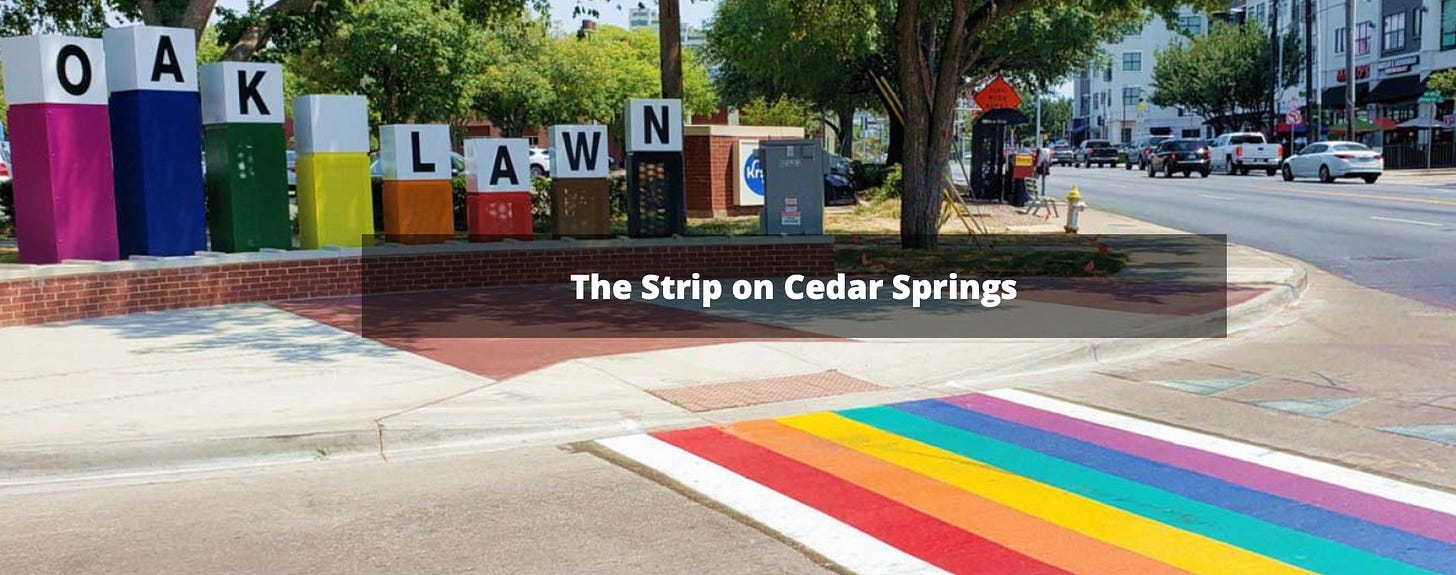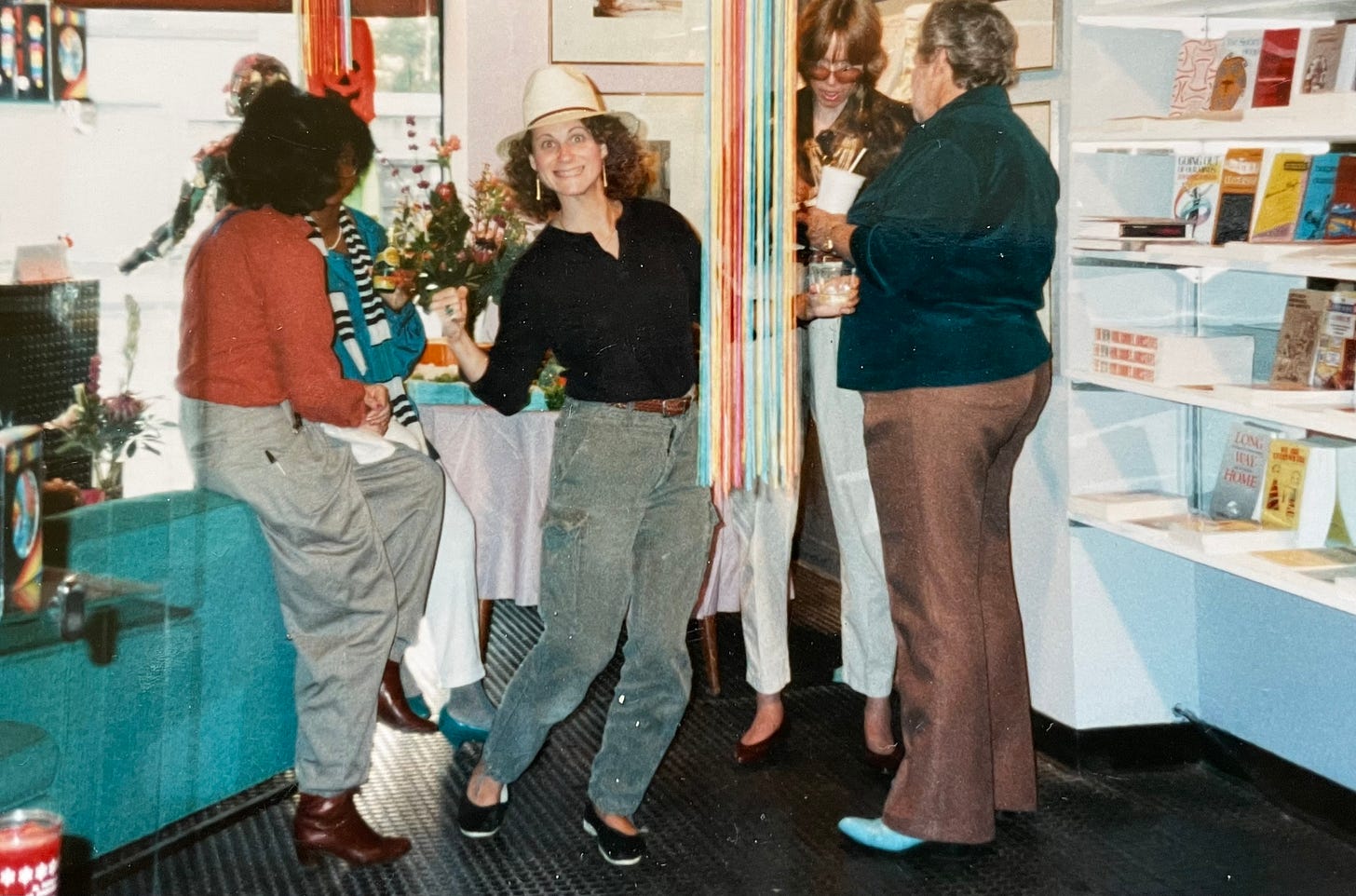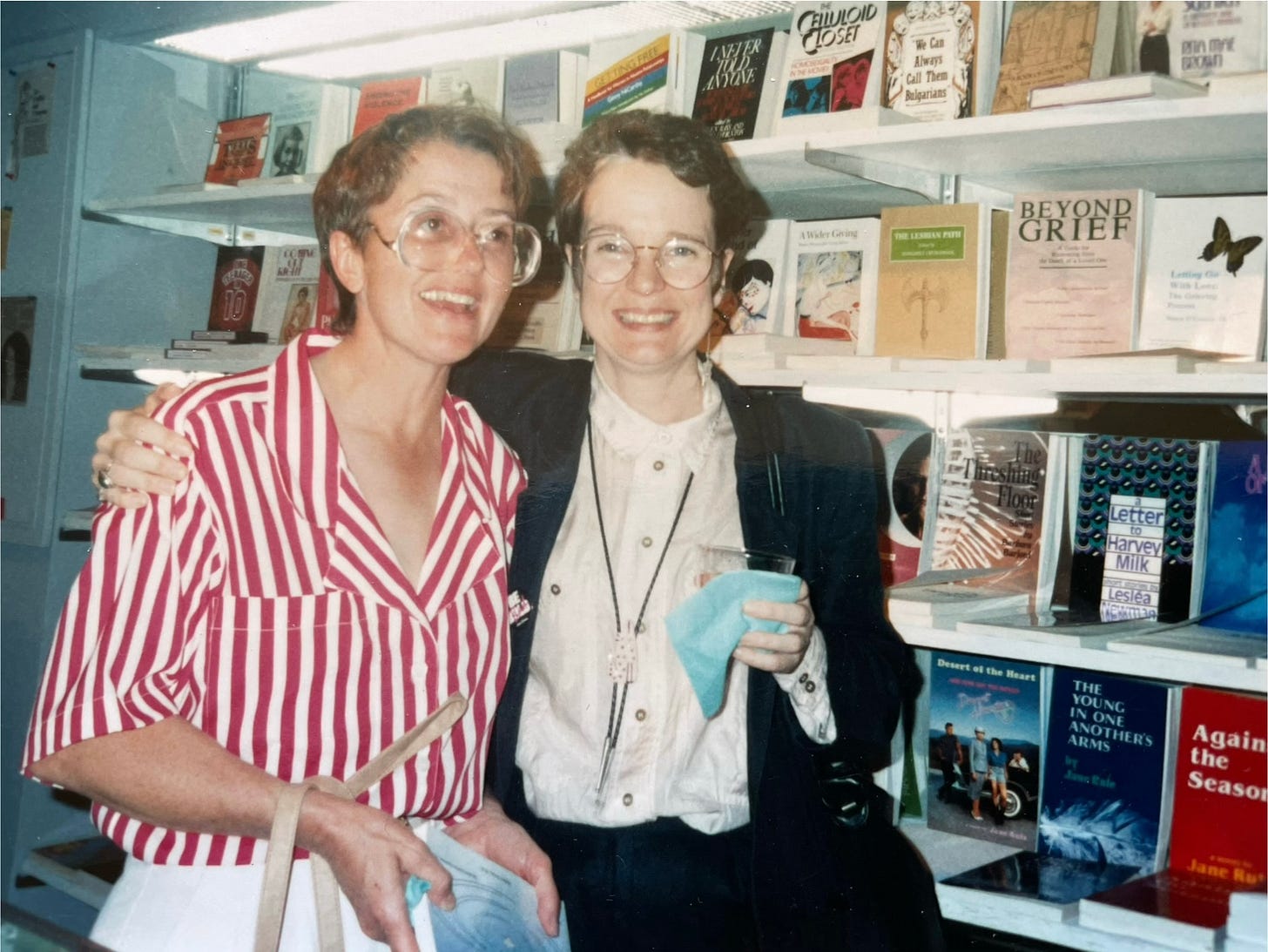It’s a splash of Texas braggadocio – the picture that pops up when The Strip on Cedar Springs link gets clicked. My, how things have changed!
The Oak Lawn neighborhood of Dallas did not brag about its little secret space, The Strip, back in my day. The longish one-block sector did not shout out its name when I knew it. Nope, back in the 70s, into the 80s, this hood was a covert location, where queer people found each other, mainly gay men.
Along The Strip that was part of Cedar Springs Road there were several bars for the guys, a handful of restaurants, a men’s wear store, a hamburger joint, and Crossroads Market, a shop full of eclectics – including antiques, gay-themed greeting cards and books that catered to gay men. The store was owned by key political players in the gay community, members of the patriarchy of course.
Lesbian was not spoken on The Strip. There was one dyke bar, Sue Ellen’s. It was owned by a man, but thank the goddess anyway! A women’s bar back in the day was the only public place where we could touch each other and not be subject to heterosexual bad behavior or worse. There were a few other lesbian bars scattered in East Dallas that were owned by women.
It was 1986. Time for The Strip to take on needed alterations. While it was becoming the nucleus of the gay community – home to the Dallas Gay Alliance and the AIDS Resource Center – the gals needed more than just a lesbian bar in which to congregate. Closeted lesbians needed choices and in the lesbian world back then bookstores played a critical role – not just as a place to discover hard-to-find books, but a place to find community and feel safe.
The dearth of lesbian literature in Dallas’ gayborhood made it clear to me and Storm, my new love and soon-to-be business partner, there was a need to expand that universe, make sure there was a bookstore stocked with feminist literature, relationship advice, spiritual guides, and lesbian romance novels that weren’t dark and depressing, like they had been in the before times.
“We need to find a space for lots of books,” I said, followed by, “and it must be on The Strip.” Storm agreed. “I know the owner of the Bronx Restaurant,” she said. He owns quite a few places on Cedar Springs.” I’ll get a hold of him. There’s a vacant spot across from where we are right now. Maybe it’s his.”
Storm and I were at a pizza place on Cedar Springs. We schemed there with regularity – sipping red wine, dining on salad and pizza, dipping the best bread ever into the most delicious olive oil on earth. This particular night, I was very excited about the prospect of getting that spot on the other side of the street for the bookstore. The location was perfect. The dream was materializing before our eyes.
It turned out the gay man who owned the Bronx also owned the vacant spot. The former tenants had just finished moving out. We told him we wanted the place sooner rather than later. He said it was available in 30 days, at which time we would owe two months rent and proof of insurance. Storm and I crossed fingers that the move-in would go smoothly. I’m not sure either one of us realized the huge risks we were taking, money being primary. We were living in the moment.
The vacant space was the perfect place for our bookstore. Nestled deep in the heart of Dallas’ Oak Lawn neighborhood that was home to a growing gay community, the store would sit in front of the leather shop, next door to Hunky’s Hamburgers, at the corner of Cedar Springs and Throckmorton, just a softball throw from Crossroads Market and right down the way from The Round Up bar.
It was Storm’s idea to name the bookstore Curious Times. It made perfect sense and played off Katherine V. Forrest’s first novel Curious Wine, which remained a mainstay among the books we kept on the shelves after opening our doors.
The novel is often referenced as “a timeless lesbian romance.” It had a sweet ending – thank the goddess! – unlike all the deep, dark, depressing, demeaning lesbian romance pulp fiction that preceded it for decades. Think: Well of Loneliness. The title says it all.
Curious Times was certainly going to change the tenor of “Boys’ Town,” which, of course, was our intent.
We signed the lease for the space a few weeks before 1986 drew to a close, and at that point, Storm and I began setting the building blocks for the bookstore – opening a bank account, filing paperwork with the feds for our business to form an LLC (Limited Liability Corporation).
Storm offered her custom jewelry business as collateral. A year or so earlier she had set up shop in the back of Crossroads Market, selling her products to mostly queer men. In that rented space, she became a meeter and greeter, befriending many of the gay men who had money and were interested in custom jewelry — for themselves, their boyfriends, and their mothers. These gay boys, with their generous disposable incomes, would soon become our customers.
In order to open our doors, we needed money in the bank – for books and other items, such as ready-made jewelry, candles and incense, greeting cards. We needed glass display counters, a cash register. The money to buy the inventory would come from my personal bank account – an inheritance from my father, with whom I had reconnected a few years earlier after a very long time.
Here’s part of the backstory to that: During my childhood, following a swift divorce and quick boot out the door, my mother, Mozelle, kept my father away from me and my sister with resolute pertinacity. She lost patience quickly when my father struggled to keep a job and routinely enjoyed booze to a fault. She was a quite looker, also judgemental and somewhat mean-spirited, in large part the result of patriarchal rules that kept tripping her up when she crossed the threshold of adulthood, just like those rules tripped up other women of her generation, then the next gen, and the next after that, and so on and so forth.
Suffice it to say, in my early thirties I made contact with my father, who had sobered up. We began spending time together. Our coffees and dinners were filled with marvelous conversations and shared stories. It was a beautiful gesture of love that my father, Curtis, who passed in late 1985, gifted me that nice chunk of funds which became the start-up money for the bookstore. (Over the next five years, Curious Times was fortunate to have three silent partners who helped keep the dream alive, until it wasn’t.)
We spent my inheritance money on books, filling the shelves at Curious Times with the likes of Herotica, Macho Sluts, The Joy of Lesbian Sex, The Well of Loneliness, Curious Wine, and Beyond Acceptance. The money also went to buy lesbian music, aka “women’s music – 33 LP vinyl records. Cassette tapes were barely making an entrance into the consumer market at the time.
We ordered wholesale jewelry through a distributor in Albuquerque, focusing on necklaces, earrings and bracelets. I found a place to buy candles, greeting cards and my favorite item, postcards refashioned from vintage photos.
And in an effort to offer a spiritual element and all that is goddess and goodness, Storm and I drove from Dallas to southern Arkansas and filled a half dozen or so small boxes with crystals and rocks we purchased. When we returned from that trip I found a few places where we could buy incense, smudge sticks, and small round pieces of charcoal to burn copal. We wanted to stock all the usual lesbian accouterments one might expect to find, except for sex toys, which were illegal to sell in Dallas County, and the rest of the state for that matter.
Finally, in early February of 1987, less than a year after we started planning, Storm and I opened the doors of Curious Times. Time to party down!
The mood at our splendid grand opening was joyful and festive. Dallas’ butches and femmes, long hidden in the closet, heard the word about a celebration, a coming out party for Curious Times, a bookstore catering exclusively to them. And to kick off the arrival of lesbians to the gayborhood, there was lots of champagne, delectable hors d’oeuvres, and loads of smiles and hugs.
Curious Times quickly became a vibrant and safe space for lesbians to congregate, at a time in Dallas when lesbians were easing out of the closet as queerness was slowly inching its way into the public square. The confinement of the closet was becoming untenable – claustrophobic and toxic.
The bookstore drew lesbians who had never ventured into the gayborhood, but were finding the courage to drive to Cedar Springs Road, looking for Curious Times, where many would have the pleasure of walking into a space they’d never encountered before — Pure Lesbian Territory.
It wasn’t easy for many to take the risk of being outed – which was highly unlikely, as they were in the gay part of town. But it was a real fear nonetheless. Coming out of the closet was not a one-time event, either. It happened over and over – getting outed in front of a straight co-worker, friend, or neighbor. That tenor of the times called for vigilance, hyper alertness – which, for some, would become PTSD triggers down the road.
One day, a woman walked into Curious Times and we got to talking. Turns out her partner was sitting in their car, parked in the lot adjacent to the bookstore. She feared someone might see her and make the lesbian connection if she came inside. That’s no way to live.
Big D’s queer neighborhood offered a comfort zone that accommodated our deep-seeded obligation to move through the process of coming out and reveal our true self to the world. The queer zone gave lesbians and gay men a stage to practice on. We rehearsed who we knew we were but never had the chance to be. Until we played and romped with people like us and began to find bits and pieces of ourselves.
Now that lesbians had their own space in the gayborhood, lesbian-ness began to spread out along Cedar Springs, causing us to dodge and dart the gender potholes caused by the patriarchy. There was Sue Ellen’s, the only bar for the gals, but at least there was one, even if it was owned by a man. The rest of the drinking establishments in Boys’ Town catered to men. The bars with music and a dance floor had a policy to keep the gals at bay — open-toed shoes were not allowed.
There was no sign on the wall to announce the shoe rule that I can remember, just a polite, verbal notification from the bouncer, whose job it was to give a once-over to every patron’s footwear. But it was easy for lesbians — who sometimes wore open-toed shoes — to hit the dance floor at The Round Up, where cowboy boots were practically mandatory. Who in their right mind would want to two-step in open-toed shoes? It’s practically a crime, if you ask me — or most Texans, for that matter.
P.S. The shoe rule also applied to Black folk who, too boot, were asked to show an ID. Gender didn’t matter, men didn’t get a pass.
With Curious Times’ doors open for business, Storm and I began politicking for lesbians, publicly calling for the Dallas Gay Alliance to include Lesbian in its name, for one thing. We argued the word validated us as members of the queer community and made us visible to heterosexuals.
In one of the many articles written about the topic, I was quoted in the weekly gay newspaper, the Dallas Voice:
“We’ve been to conferences and meetings all over the country and this city [Dallas] is known for its insensitivity to this issue,” said Kay Vinson, co-owner of Curious Times.
Furthermore, the point of using the word lesbian I said, “is to bring the female homosexual into a higher profile. When they hear the word ‘gay,’ most heterosexuals automatically think ‘man.’ We [lesbians] need to rid ourselves of the oppression of invisibility…”
With a snap of the fingers, the inclusion of the word could have been done, but instead the gay men at the helm said no, they were too busy dealing with AIDS. Simultaneously, lesbians were lovingly and voluntarily caretaking gay men in various stages of the deadly virus.
Here’s the extra icky part. It was the patriarchy, at the direction of President Ronald Reagan, that refused to acknowledge AIDS, sadly allowing gay men to die indiscriminately in unconscionable numbers . It was also the patriarchal thinking within the Dallas Gay Alliance that continued to exclude lesbians – sisters on the one hand and less-than on the other.
Hard to say when the Patriarchy will crumble into dust and catch a breeze to the nearest black hole. Fortunately, I have not been holding my breath.
As lesbians were coming out of the closet in the 1980s, they were also gleefully meeting others of their ilk, dating, finding wonderment in the liveliness of their libido and diving into relationships, where they often found themselves as clueless as a dyke in spiked heels and wearing lipstick.
Many of these gals quickly headed to talk therapy to deal with relationship issues. After all, the only model we knew was the hetero stereotype of the 1950s and 60s. Therapists — recently graduated from university and fresh out of the closet themselves — flocked to the gayborhood, ready to embrace the challenge of therapy on the fly.
Part 3. Coming Soon. Meanwhile, I invite you to read some of what I’ve already published by checking out my archives.
If you are finding my work valuable, meaningful, or the least bit inspiring, I’d truly appreciate your support with a one-time donation…
…or a paid subscription.





Thank you for Curious Times, Kay! You helped to empower women in Dallas… no small accomplishment. And you raised consciousness in the gayborhood in a big way.